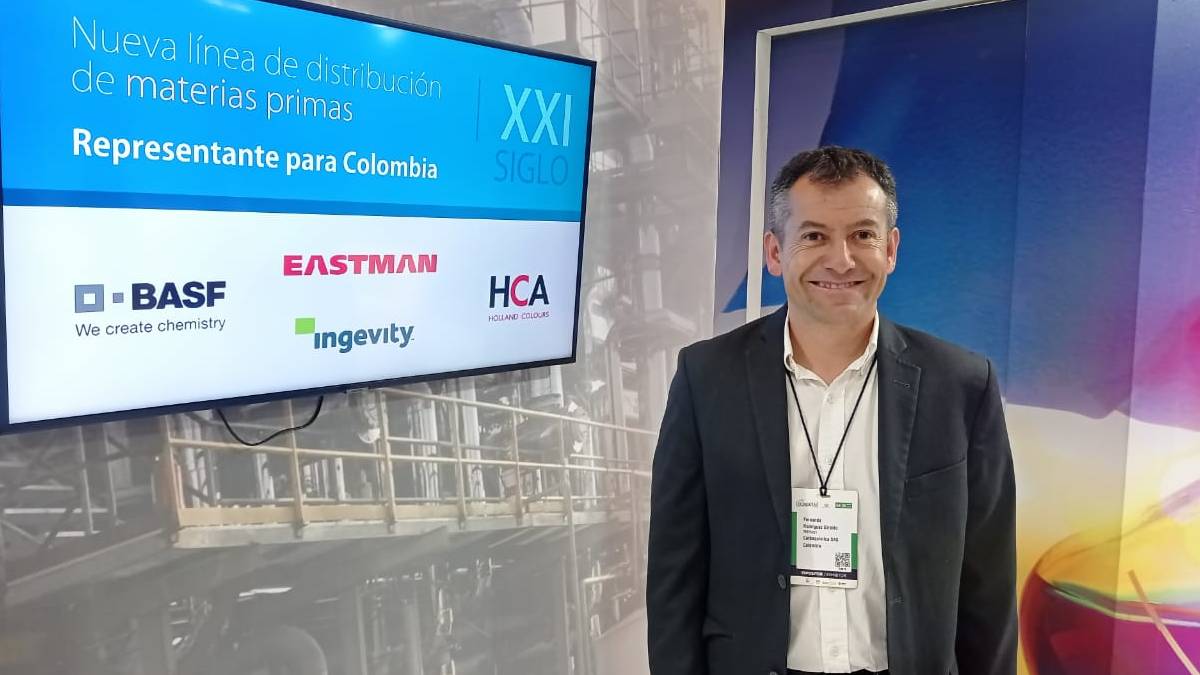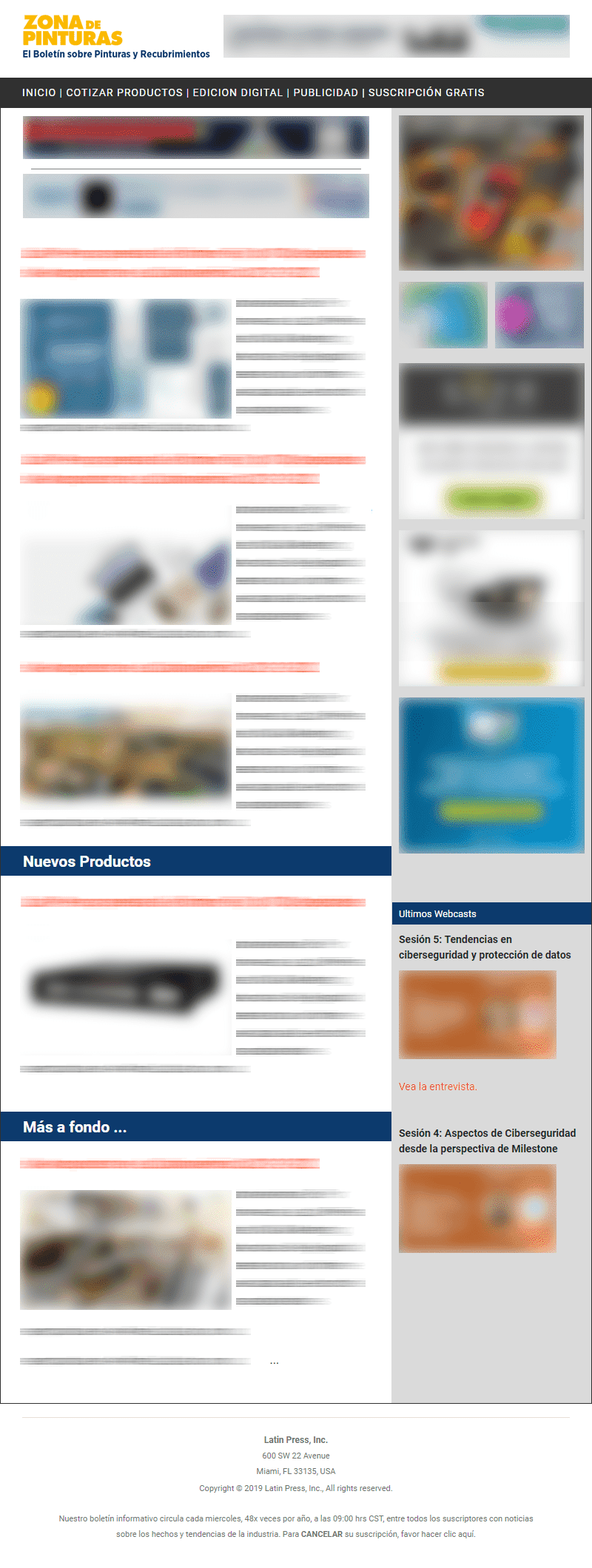Latin America. During the Colombia Pinta fair, we talked with Fernando Rodríguez Giraldo, commercial manager of Carboquímica, about the trends with which the industry has been rediscovered.
Fernando, what does this fair, Colombia Pinta, chapter of ColombiaPlast organized by Acoplásticos, reflect?
Well, obviously it is a moment of reunion with many people that one did not see from the industry three or four years ago, in times of pre-pandemic.
I feel like we're not 100% yet; we didn't really get to that level of face-to-face that we had before the pandemic. However, it has been a space to meet people again, to obviously test the new developments that exist for the industry, and obviously the transversal theme that is that of sustainability is felt.
I have always maintained that the pandemic taught us that we are all riding the same boat. We had the world paralyzed for a few years in the year 2020.
We are all aware that the pandemic changed us. I think we are all well aware of the problem of climate change. We are experiencing the consequences of that climate change, and we know that this is a purpose that has to go through all companies, because that one does show that it is an issue that is at the top of the agendas around the world.
But obviously we are all also very aware that the petrochemical world cannot end overnight, and that we are living moments of a transition that, no matter how much technology advances at a very fast pace, we will not be able to replace everything we use today in petrochemicals, nor in the plastics industry, nor in the paint industry, because it is practically present in all the moments of human beings.
In that need for transition we are all talking about the carbon footprint, how we reduce it. So I think that's the moment that the planet is experiencing, and I think the fair is a reflection of that.
What industry trends have been derived precisely because of this pandemic?
We represent some leading companies worldwide, and in their agendas is to generate actions that are more friendly to the environment.
Most already have products, but in a phase or small scale, of biobased origin to replace, for example, isocyanates that are of petrochemical origin, and sometimes have a very marked carbon footprint; or let's also say that the waste they generate, or the need to use solvents, make it not ideal at this time that we need that change.
However, we also realize that these are things that are in a modeling stage or early production phases, and that a lot of research is needed from now on to fully replace petrochemical-based products.
Possibly, we talked about it last week with one of our suppliers, our generation is not going to see that, but we are seeing the beginning of change. Surely the next generation will make use of these new techniques; for example in automotive repainting.
There is also a clear trend that today everything that is built is in a way that lowers the carbon footprint, that the materials used are either recycled or meet certain standards, and that also allow to lower the use of energy.
For example, in Europe, a lot of work is being done to design houses that allow them to be better thermal insulators; both in very marked summer times, so that the heat does not enter, and in winter times, so that the cold is not felt. The entire construction industry and the paint industry are involved there. Those are the trends we're seeing today.
Let's delve a little deeper into which verticals and what kind of innovations are being presented in the market.
Everything tends to have a lower carbon footprint.
There are like two stages: one is the manufacture of the product, and there I think we are all looking to be more efficient from the energy point of view; either with solar panel projects, or gas, that allow replacing other more polluting energy sources.
There I believe that companies are working hard to reduce the carbon footprint or reduce water use. For manufacturing processes, the reduction of the use of water is sought, so that it can be replaced and meet a good number of cycles before it can no longer be used. Obviously, there is the issue of dumping.
That's a very thick issue: that of production. Secondly, when the product reaches the end user; either in the subject of construction or paintings, there are new trends where it is sought, for example, that paints, apart from fulfilling a decorative function, fulfill a function of insulators. As I mentioned, allow houses to consume less in heating or air conditioning.
From that perspective today it is much easier to manufacture a house with all the new concepts, which come in the subject of using products that in their manufacture have been said environmentally conscious, but also in their use allow an optimization of resources. I think those are the two big trends.
Now, I believe that the applications are in all industries: automotive, hospital issue... But I think that also one of the great challenges in countries that have not reached the levels of development of European countries, for example, is that we can access those technologies that, although they are more expensive, guarantee a little more sustainability than continuing with conventional processes.
How is Latin America to embrace these technologies?
Unfortunately, we are very much subservient to government initiatives. If the government does not bring out regulations that force manufacturers to make the changes, despite the fact that the leading companies are already working a lot on the issue, they have a competition that is completely price-oriented. So that's kind of an anchor.
For example, here in Colombia there are still customers who talk to one about nitracellulosic lacquer that uses methanol and other types of components that are completely harmful in manufacturing; however, as there is no clear, forceful legislation that forces them to make technological change, then that is where that remains.
It remains anchored a use that should not be given at this time that the planet has the need to make radical changes, even for the safety of both the people who manufacture and those who consume.
So we are very much subject to government initiatives. And as I tell you: that is an anchor so that companies that want to do innovation do not do it or do not do it at the speed they would like, because they have a competition that is completely price-oriented. It's an unfortunate thing.
So, to the extent that there's more leadership together, between private enterprise and government, I think those changes can be more accelerated, and I think that's what everyone at heart wants.


























Leave your comment